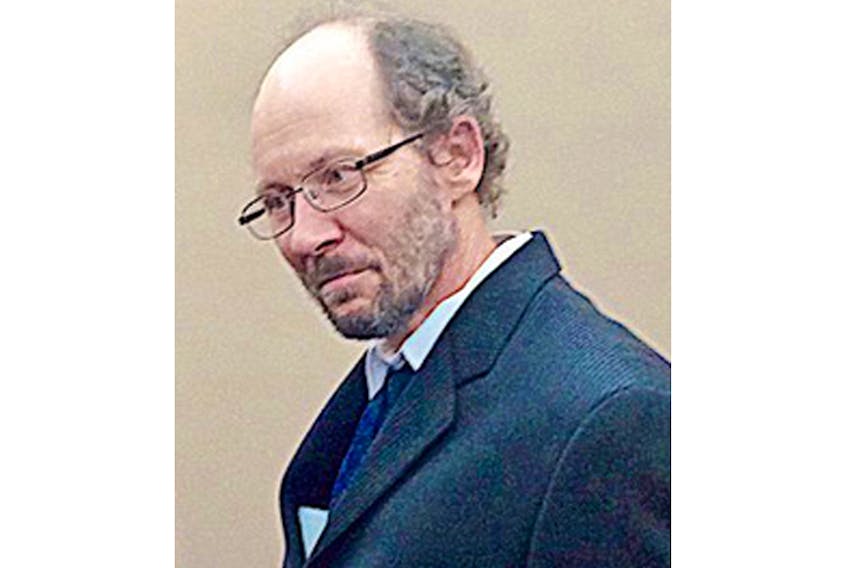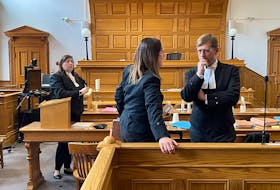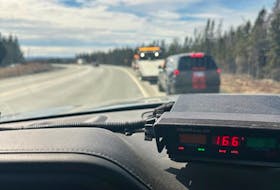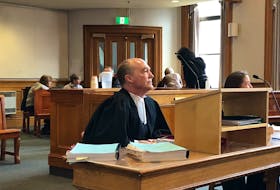A St. John’s man charged after he allegedly imported a child sex doll from Japan failed in his latest application to the court Monday.
A lawyer for Kenneth Harrisson, 53, argued that evidence presented last year during the testimony of forensic psychiatrist Dr. Peter Collins should be thrown out on the grounds that he was biased and his statements went beyond his expertise.
Collins, an Ontario-based expert in sexually deviant behaviour, had been sent photos of the doll by RNC investigators, who asked him to provide his opinion on whether or not the doll fit the criteria for child pornography. Collins said it does.
“In my professional opinion, the possession of a sex doll is just another form depicting a child for a sexual purpose and therefore would meet the criteria of child pornography,” Collins wrote, and repeated his opinion on the stand. “If (Harrisson) ordered the sex doll … in my professional opinion, he likely has an erotic attraction to prepubescent children.”
Related stories:
St. John’s judge denies request for dismissal of sex doll case
Missing police notes are fundamental in St. John’s sex doll case, defence says
Photo of restaurant statue a focus at child sex doll trial
Collins acknowledged he had never assessed Harrisson and wasn’t able to provide a diagnosis, but said, “Clinically, the majority of these men meet the criteria for the diagnosis of pedophilia.”
Brittany Whalen, who is representing Harrison alongside fellow defence lawyer Bob Buckingham, said Monday Collins had made “sweeping generalizations and applied them to (Harrisson).”
Regarding Collins’ assessment of the doll as childlike, Whalen said he hadn’t considered beauty and body standards in Japan and had relied on information supplied by the police instead of viewing and measuring the doll himself.
Whalen said Collins’ testimony displayed tunnel vision, and he had cherry-picked evidence on the doll manufacturer’s website to fit the Crown’s case.
Prosecutors Dana Sullivan and Bill Howse argued Collins had played no role in the police investigation of Harrisson, and had supplied his opinion only after Harrisson had been charged.
“Dr. Collins’ opinion was confirmatory, but it didn’t have to be,” Sullivan said, pointing out Buckingham had cross-examined Collins at length about how he had arrived at his opinions.
There’s no evidence Collins had partnered with the Crown, Sullivan argued, and pointed out he is a medical doctor and thus is qualified to give his opinion on the general age of the doll. Collins had considered the dimensions of the average Japanese woman, Sullivan said, and dismissed the doll as fitting them.
Judge Mark Pike dismissed Harrisson’s application, saying he had already qualified Collins as an expert witness more than a year ago, and found no new issues raised since then in the application. The judge noted, however, that Whalen’s criticisms of Collins’ evidence could go toward the weight he placed on it later.
The defence is calling one witness to testify: Harrisson. He is scheduled to take the stand when the case is called again in December, although the judge advised the lawyers to try to schedule a sooner appearance.
In April, Pike dismissed an application from Harrison that argued for the dismissal of his charges on the grounds that child pornography laws interfere with his rights. Harrisson said his right to freedom of expression and other rights are breached by child pornography laws, which are discriminatory to pedophiles.
Pike said the laws aren’t discriminatory because they apply to everyone, and found that pedophiles are not a recognized group under the relevant section of the Canadian Charter of Rights and Freedoms.
Harrisson was arrested in March 2013 after police performed a controlled delivery of the four-foot box containing the doll, which was addressed to Harrisson and sent from a Japanese company that was on Canada Border Services’ watch list. At the time of his arrest, Harrisson told police it was a “love doll.”
Police determined Harrisson paid $1,009.36 to the company, which advertises lifelike female dolls in a range of sizes, from adult to “innocent daughter.”
Harrisson has pleaded not guilty to one count each of possessing child pornography and mailing obscene matter, and charges under the federal customs act of smuggling and possessing prohibited goods.
Earlier this month, a man in the U.K. was convicted of a similar obscene matter charge as well as a charge of possessing images of child pornography after border officials intercepted a package. He was sentenced to three months in jail and 12 months probation as well as registration on the sex offender list for five years.
Last week, the U.S. House of Representatives passed legislation that would ban the importation of child sex dolls to that country. The Curbing Realistic Exploitative Electronic Pedophilic Robots (CREEPER) bill passed unanimously June 13 and will move to the Senate for consideration.
The bill was tabled by New York City Republican Congressman Dan Donovan — touted by U.S. President Donald Trump on Twitter as helping him “make America great again” — who called the dolls “vile” in a media statement.
“This is not only disturbing, but also endangers the most innocent among us,” Donovan wrote. “My bill takes necessary steps to stop these sickening dolls from reaching our communities.”
Twitter: @tara_bradbury









